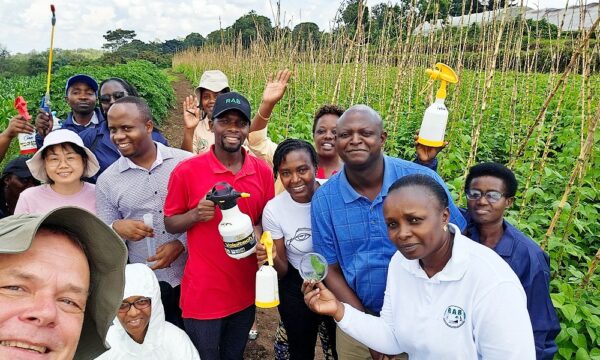In 2010, we commenced with a controlled release of the specialist Japanese knotweed natural enemy, Aphalara itadori, in the UK. This has been the culmination of many years of project development and intense research and is effectively a first for Europe, at least as far as weeds are concerned.

Japanese knotweed pushing through tarmac in Buckinghamshire (CABI)
Towards the end of the process, one of the potentially tricky hurdles was the public consultation, whereby anyone with the time to register an opinion was welcome to do so online. This was a true test of public opinion and proved to be quite interesting. The juxtaposition between the Victorian ‘neophilia’ at the time of knotweed’s promotion as a horticultural oddity and today’s perceived and pervasive risk averse attitudes is stark. However, the consultation revealed a remarkably balanced view with most people willing to accept the risks associated with biological control on balance considering the current threat posed by the target weed set against the continual and ever increasing introduction of new species globally. This was also reflected in the dozens of presentations our team has given over the years where audiences of people whose only knowledge of biocontrol was the cane toad, were almost always convinced by the science of the safety testing carried out. The one message that came across loud and clear by almost all reviewers was that they were impressed by the amount of research involved and reassured by the monitoring and contingency plan backing up the releases. It is impossible for any scientist to give concrete guarantees and the carefully chosen words one is forced to use can easily be misinterpreted as evasion and a lack of confidence. In the UK we have the advantage of many years of drip feeding information on invasives to the media, helped by the Non-Native Species Secretariat activities, to the point where the fact that each has lost their natural enemies is almost always stated. This is perhaps not the case with our European cousins. It will be even more interesting to see how the populations of other EU Nations, and their representatives see the chance to use this technique for the first time too. Will they welcome it as a very cheap potential solution to an every growing problem or a counter-intuitive leap into the unknown?
Written by Dick Shaw, Principal Investigator on the knotweed project
For more information visit: Japanese knotweed Alliance
Related News & Blogs
Biological control in action: Zambia’s field days on fighting fall armyworm
Experts from CABI recently held two field days and an expo in Zambia, showcasing innovative approaches to pest management to 584 farmers, agro-dealers and other stakeholders to help raise awareness of approaches to tackle the invasive fall armyworm (Sp…
11 June 2025




